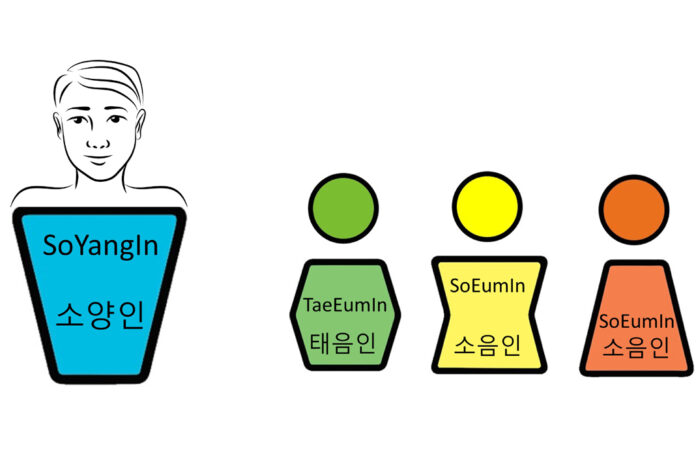Body types were already discovered by the world since antiquity.
By David Lee, L.Ac.
Doctor Jema Lee, a Korean physician and founder of Sasang herbal medicine in 1893, is respected for identifying the constitutions and improving upon herbal formulas to better treat diseases. Sasang means four constitutions in Korean. The challenge has been establishing the correct constitutional diagnosis. Through the work of scholars of the world, we now have many ways to identify the Soyangin constitution. The word Soyangin means Lesser Yang person in Korean. “So” is Lesser, “Yang” is Yang, and “In” is Person. This Lesser Yang person is the same as that of the ancient bigram where Yang is in the upper and Yin in is the lower position.

A Soyangin has large Spleen and small Kidney organs. For treatment, Dr. Jema Lee prescribed herbs and foods to make Spleen smaller and Kidney larger. Today, we find that the constitutions discovered in Korea were not unique to Asians. India, Europe, and United States also had identified the same types. Beginning with Hippocrates in 400 B.C. down to the 20th century, many scholars had identified the four constitutions in their variant characteristics.
|
Jema Lee |
SOYANGIN |
|
Hippocrates |
Blood |
|
Unani Tibb Galen-Avicenna |
Sanguine |
|
hot and wet |
|
|
Ayurveda Dosha |
Pitta Pitta-Vata |
|
Social Styles |
Expressive |
|
DiSC |
Influencing |
|
Myers-Briggs |
ENFP, INFP, ESFP, ISFP |
|
Need Theory |
Achievement |
My observation of Soyangins are big dreamers, often idealistic. They see the big picture with possibilities of a positive outcome. Their excitement is observable by a rapid speech, exaggerated gestures, rapid eye movements, intense emotion, ability to change subjects quickly, skilled interpersonal interaction, fast-paced gait, and desire to share personal stories. Because they are not willing to stay with the status quo, their mind is in a frequent position to make adjustments. They openly communicate their feelings and thought processes, which seem unguarded and revealing.
In Unani Tibb, a Sanguine is Soyangin. Unani describes a Sanguine as having an optimistic positive mental outlook. They are persuasive extroverts and have good social skills. They have romantic nature and are confident, poised, graceful and enthusiastic. They like to travel, to play games and distractions.
In Ayurveda, a Pitta type is Soyangin. They are generally creative and often impulsive. They are go-getters driven by intensity and passion. They are small to medium in stature and usually quite agile.
According to Social Styles, an Expressive is Soyangin. They are faster-paced, make effort to involve, show less concern for routine, work in the future time frame, tend to act impulsively, and tends to avoid isolation.
According to DiSC, “I” is a Soyangin. They thrive on the attention and approval of other people, and they’re more motivated by praise and appreciation than most other types. Despite their outgoing attitude, they’re often unwilling to risk causing offense, and they’ll often avoid possible confrontations. They are socially confident and tend not to be particularly assertive or forceful.
According to Myers-Briggs Type Indicator of 16 types, there are 6 types that are Soyangin. They are ENFP, INFP. ENTP, INTP, ESFP and ISFP. The commonality is a Perceiving function, which is open to different possibilities and do not mind spontaneous changes, whereas the opposite Judging function is more comfortable with repetition of the same. You can look up their descriptions on www.16personalities.com.
In Need Motivation Theory, a Need for Achievement is a Soyangin. They prefer prefer work in which the results are based on their effort rather than on anything else and prefer to receive feedback on their work. Achievement based individuals tend to avoid both high-risk and low-risk situations. Low-risk situations are seen as too easy to be valid and the high-risk situations are seen as based more on the luck of the situation rather than the achievements that individual made. This personality type is motivated by accomplishment in the workplace and an employment hierarchy with promotional positions.

































